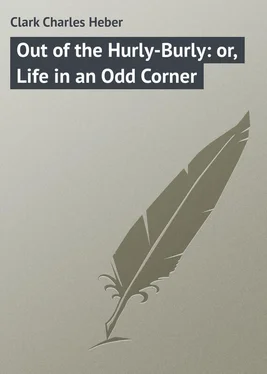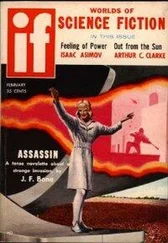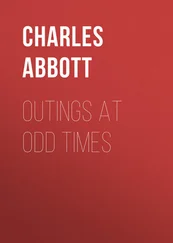Charles Clark - Out of the Hurly-Burly - or, Life in an Odd Corner
Здесь есть возможность читать онлайн «Charles Clark - Out of the Hurly-Burly - or, Life in an Odd Corner» — ознакомительный отрывок электронной книги совершенно бесплатно, а после прочтения отрывка купить полную версию. В некоторых случаях можно слушать аудио, скачать через торрент в формате fb2 и присутствует краткое содержание. ISBN: , Жанр: foreign_prose, foreign_humor, на английском языке. Описание произведения, (предисловие) а так же отзывы посетителей доступны на портале библиотеки ЛибКат.
- Название:Out of the Hurly-Burly: or, Life in an Odd Corner
- Автор:
- Жанр:
- Год:неизвестен
- ISBN:http://www.gutenberg.org/ebooks/42190
- Рейтинг книги:5 / 5. Голосов: 1
-
Избранное:Добавить в избранное
- Отзывы:
-
Ваша оценка:
- 100
- 1
- 2
- 3
- 4
- 5
Out of the Hurly-Burly: or, Life in an Odd Corner: краткое содержание, описание и аннотация
Предлагаем к чтению аннотацию, описание, краткое содержание или предисловие (зависит от того, что написал сам автор книги «Out of the Hurly-Burly: or, Life in an Odd Corner»). Если вы не нашли необходимую информацию о книге — напишите в комментариях, мы постараемся отыскать её.
Out of the Hurly-Burly: or, Life in an Odd Corner — читать онлайн ознакомительный отрывок
Ниже представлен текст книги, разбитый по страницам. Система сохранения места последней прочитанной страницы, позволяет с удобством читать онлайн бесплатно книгу «Out of the Hurly-Burly: or, Life in an Odd Corner», без необходимости каждый раз заново искать на чём Вы остановились. Поставьте закладку, и сможете в любой момент перейти на страницу, на которой закончили чтение.
Интервал:
Закладка:
"Do you hear me, miss?" demanded the professor, when she perceived that that blooming contractor of the orbicularis oris did not budge.
"Yes," she said, "I am conscious of a vibration striking against the membrana tympanum, and being transmitted through the labyrinth until it agitates the auditory nerve, which conveys the impression to the brain."
"Correct," said the professor. "Then obey me, or I will call my biceps and flexors and scapularis into action and put you in your place by force."
"Yes, and we will help her with our spinatus and infra-spiralis," exclaimed the rest of the class.
Magruder's brother in the gloom of his closet did not comprehend the character of these threats, but he had a vague idea that the life of that lovely young saw-bones was menaced by firearms and other engines of war of a peculiarly deadly description. He felt that the punishment was too severe for the crime. Magruder himself, he was convinced, would have regarded that orbicularis operation with courageous fortitude and heroic composure.
Mrs. Magruder then proceeded to give the class practice in certain operations in medical treatment. She vaccinated Magruder on the left arm, while one of the students bled his right arm and showed her companions how to tie up the vein. They applied leeches to his nose, under the professor's instructions; they cupped him on the shoulder blades; they exercised themselves in spreading mustard plasters on his back; they timed his pulse; they held out his tongue with pincers and examined it with a microscope, and two or three enthusiastic students kept hovering around Magruder's leg with a saw and a carving-knife, until Magruder's brother in retirement in the closet shuddered with apprehension.
But the professor restrained these devotees of science; and when the other exercises were ended, she informed the students that they would devote a few moments in conclusion to study of the use of the stomach-pump.
Dr. Jones continued: "I shall not enter into particulars concerning the scene that then ensued. There is a certain want of poetry about the operation of the weapon just named, a certain absence of dignity and sentiment, which, I may say, render it impossible to describe it in a manner which will elevate the soul and touch the moral sensibilities. It will suffice to observe that as each member of the class attacked Magruder with that murderous engine, Magruder's brother, timid as he was, solemnly declared to himself that if the class would put away those saws and things he would rush out and rescue his brother at the risk of his life.
"He was saved the necessity of thus imperiling his safety. Magruder began to revive. He turned over; he sat up; he stared wildly at the company; he looked at his wife; then he sank back upon the sofa and said to her, in a feeble voice:
'Henrietta, somehow or other I feel awfully hungry!'"
"Hungry! Magruder's brother considered that, after that last performance of the class, Magruder ought to have a relish for a couple of raw buffaloes, at least. He emerged from the closet, and seizing a chair, determined to tell the whole story. Mrs. Magruder and the class screamed, but he proceeded. Then up rose Magruder and discussed the subject with vehemence, while his brother brandished his chair and joined in the chorus. Mrs. Magruder and the class cried, and said Mr. Magruder was a brute, and he had no love for science. But Mr. Magruder said that as for himself, 'hang science!' when a woman became so infatuated with it as to chop up her husband to help it along. And his brother said he ought to put in even stronger terms than that. What followed upon the adjournment of the class is not known. But Magruder seems somehow to have lost much of his interest in medicine, and since then there has been a kind of coolness between him and the professor."
I shall repeat this extraordinary narrative to Mr. Parker. He ought to be aware of the propensities of his prospective mother-in-law beforehand, so that he may not encounter the dangers which attend her devotion to her profession without realizing the fact of their existence. Admitting that Jones adheres closely to truth in his statement, we may very reasonably fear that Mrs. Magruder would not hesitate to vivisect a mere son-in-law, or in an extreme case to remove one of his legs. A mother-in-law with such dangerous proclivities ought not to be accepted rashly or in haste. Prudence requires that she should be meditated upon.
"I want to ask you a question," observed Mr. Parker, as we sat out upon the porch after tea with Mrs. Adeler. "I notice that you always say 'is being done,' and not 'is doing.' Now, which is correct? I think you're wrong. Some of those big guns who write upon such subjects think so too. Grind us out an opinion."
"The subject has been much discussed, Bob, and a good many smart things have been said in support of both theories. But I stick to 'is being done,' first, because it is more common, and therefore handier, and second, because it is the only form that is really available in all cases. Suppose, for instance, you wished to express the idea that our boy Agamemnon is enduring chastisement; you would say, 'Agamemnon is being spanked,' not 'Agamemnon is spanking.' The difference may seem to you very slight, but it would be a matter of considerable importance to Agamemnon; and if a choice should be given him, it is probable that he would suddenly select the latter form."
"Just so," exclaimed Mr. Parker.
"You say again, 'Captain Cook is being eaten.' Certainly this expresses a very different fact from that which is conveyed by the form, 'Captain Cook is eating.' I venture to say that Captain Cook would have insisted upon the latter as by far the more agreeable of the two things."
"Precisely," said Mr. Parker.
"And equally diverse are the two ideas expressed by the phrases 'The mule is being kicked' and 'The mule is kicking.' But it is to be admitted that there are occasions when the two forms indicate a precisely similar act. You assert, I will say, that 'Hannah is hugging.'"
"Which would be a very improper thing for Hannah to do," suggested Mr. P.
"Of course it would; but there is an extreme probability that you would indicate Hannah's action under the circumstances if you should say, 'Hannah is being hugged.' It is in most cases a reciprocal act. Or suppose I say, 'Jane is kissing'?"
"And her mother ought to know about it if she is," remarked Bob.
"It is nearly the same as if I should say, 'Jane is being kissed,' for one performance in most cases presupposes the other. It will not, however, be necessary for you to attempt to prove this fact by practice anywhere in the neighborhood of the Magruder mansion. If you find it necessary to explain to Miss Magruder my views of this grammatical question, it will be better to confine your illustrations to the case of Captain Cook. But you can safely continue to say, 'is being built.' Nobody will object to that but a few superfine people who are so far ahead of you in such matters that they will be tolerably sure to regard you as an idiot whichever form you happen to use, while if you adopt the other form in conversation with your unfastidious acquaintances, you will be likely to confuse your meaning very often in such a manner as to impress them with the conviction that your reason is dethroned."
CHAPTER VI
The editor of our daily paper, The Morning Argus , is Col. Bangs – Colonel Mortimer J. Bangs. The colonel is an exceedingly important personage in the village, and he bears about him the air of a man who is acutely conscious of the fact. The gait of the colonel, the peculiar way in which he carries his head, the manner in which he swings his cane, and the art he has of impressing any one he happens to address with a feeling that he is performing an act of sublime condescension in permitting himself to hold communication with an inferior being, combine to excite in the vulgar mind a sentiment of awe. The eminent journalist manifests in his entire bearing his confidence in the theory that upon him devolves the responsibility of forming the public opinion of the place; and there is a certain grandeur in the manner in which he conveys to the public mind, through the public eye, the fact that while he appreciates the difficulties of what seemed to be an almost superhuman task, which would surely overwhelm men of smaller intellectual calibre, the work presents itself to his mind as something not much more formidable than pastime.
Читать дальшеИнтервал:
Закладка:
Похожие книги на «Out of the Hurly-Burly: or, Life in an Odd Corner»
Представляем Вашему вниманию похожие книги на «Out of the Hurly-Burly: or, Life in an Odd Corner» списком для выбора. Мы отобрали схожую по названию и смыслу литературу в надежде предоставить читателям больше вариантов отыскать новые, интересные, ещё непрочитанные произведения.
Обсуждение, отзывы о книге «Out of the Hurly-Burly: or, Life in an Odd Corner» и просто собственные мнения читателей. Оставьте ваши комментарии, напишите, что Вы думаете о произведении, его смысле или главных героях. Укажите что конкретно понравилось, а что нет, и почему Вы так считаете.












